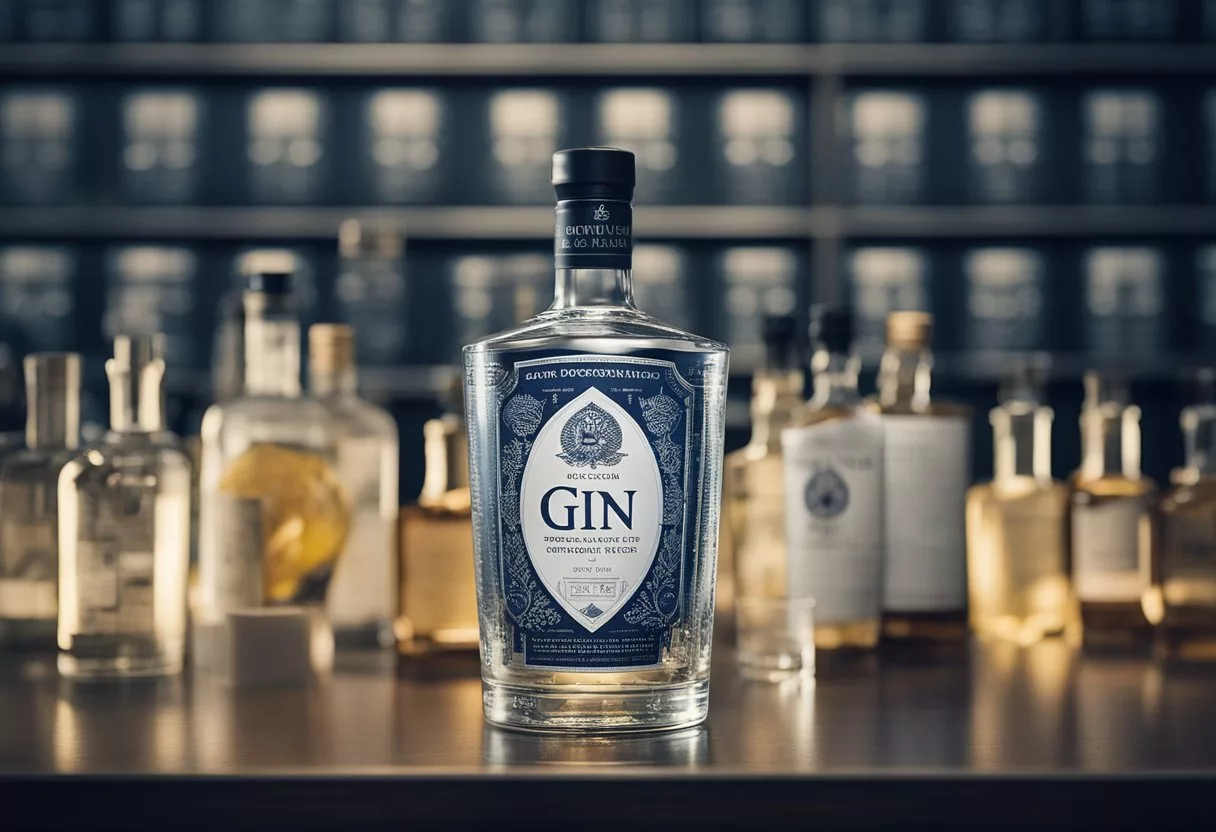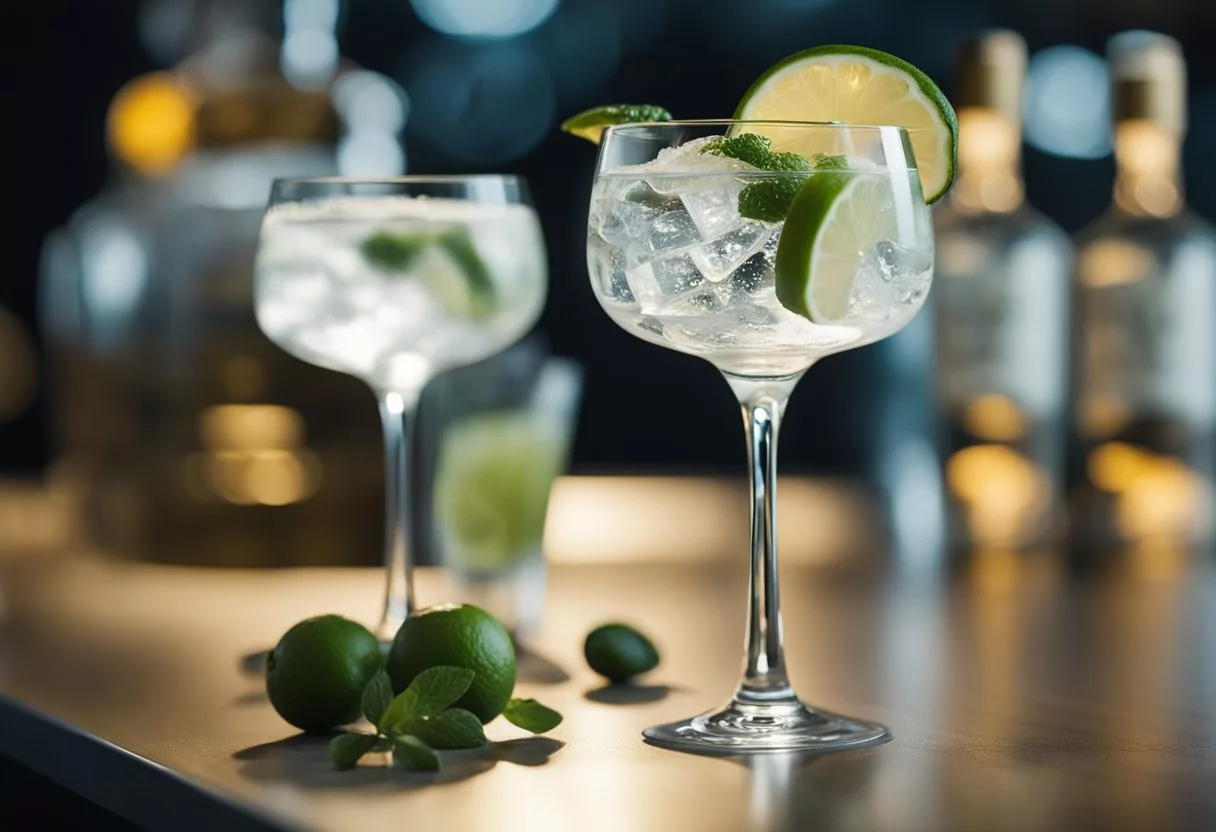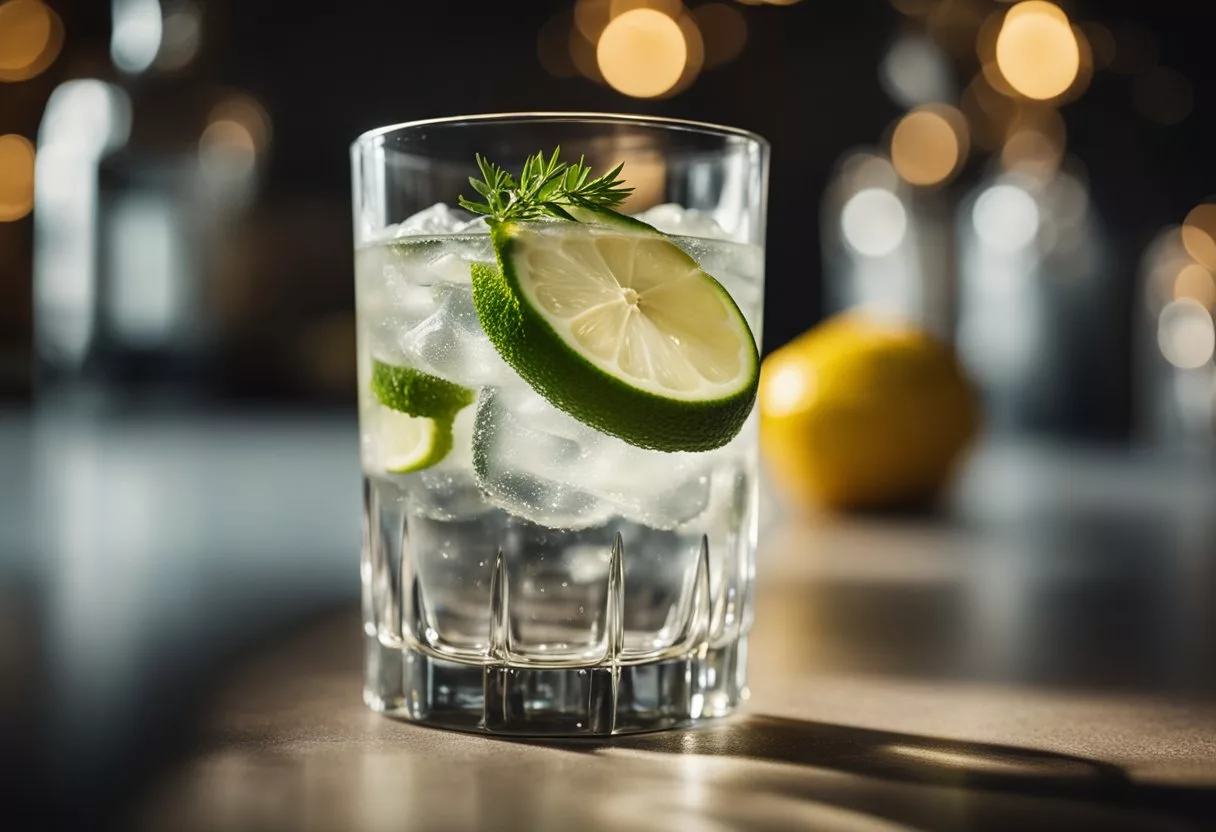Gin is a popular alcoholic beverage that has been enjoyed by many for centuries. It is made by distilling juniper berries and other botanicals, giving it a unique flavor profile that sets it apart from other spirits. While drinking gin in moderation may have some health benefits, what happens if you drink it every day?

Daily consumption of gin can have both positive and negative effects on the body. On the one hand, gin contains fewer calories and less sugar than other alcoholic beverages, making it a slightly healthier option. Additionally, the antioxidants in gin may improve blood flow and potentially lead to a longer life by improving toxin removal from the blood. However, drinking gin every day can also have negative effects on the body, such as worsening acid reflux symptoms and increasing the risk of liver damage.
In this article, we will explore the effects of daily gin consumption on the body, including both the potential benefits and risks. We will also examine how much gin is considered safe to drink and provide tips for enjoying gin in moderation. Whether you are a gin enthusiast or simply curious about the effects of alcohol on the body, this article will provide valuable insights into the potential impact of daily gin consumption.
What is Gin?

Gin is a distilled alcoholic beverage that is made from a variety of botanicals, including juniper berries, herbs, coriander, angelica root, cardamom, and others. The exact composition of gin can vary depending on the brand and the distillation process used.
Composition of Gin
Gin is typically made from a neutral spirit, such as vodka, that is then flavored with various botanicals during the distillation process. The alcohol content of gin can vary, but it is typically around 40% ABV (80 proof).
The Role of Juniper Berries
Juniper berries are a key ingredient in gin and are responsible for giving gin its distinct flavor. Juniper berries are a type of fruit that grows on juniper trees and have a piney, resinous flavor. In order for a spirit to be legally classified as gin, it must contain juniper as its predominant flavor.
Distillation Process
The distillation process used to make gin can vary depending on the brand and the desired flavor profile. However, most gin is made using a process called vapor infusion. During this process, the botanicals are placed in a basket above the still and the alcohol vapors pass through the botanicals, picking up their flavors and aromas.
In conclusion, gin is a popular alcoholic beverage that is made from a variety of botanicals, including juniper berries. The exact composition of gin can vary depending on the brand and the distillation process used. Gin is typically around 40% ABV (80 proof) and is made using a process called vapor infusion.
Nutritional Profile

Caloric Content of Gin
Gin is a distilled alcoholic beverage made from juniper berries and other botanicals. One fluid ounce (oz) of gin contains approximately 64 calories, which is less than the calories found in other alcoholic beverages such as wine and beer. Gin is also low in sugar, fat, and carbohydrates. However, it is important to note that the caloric content of gin can vary depending on the brand and the proof of the gin.
Gin vs. Other Alcoholic Beverages
Compared to other alcoholic beverages, gin is considered a low-calorie option. For example, a 5 oz glass of wine contains approximately 120 calories, while a 12 oz can of beer contains approximately 150 calories. Gin is also considered a low-sugar option compared to other alcoholic beverages that are high in sugar content.
It is important to note that tonic water, a common mixer for gin, contains sugar and calories. A 12 oz serving of tonic water contains approximately 124 calories and 32 grams of sugar. Therefore, individuals who are concerned about their calorie and sugar intake should consider using a low-calorie mixer or drinking gin neat or on the rocks.
In terms of nutrition information, gin is a low-protein, low-fat, and low-carbohydrate beverage. It is considered an “empty calorie” beverage, meaning that it provides calories but little to no nutritional value.
Overall, while gin is a lower calorie option compared to other alcoholic beverages, it is still important to consume it in moderation and be mindful of the mixers used.
Health Implications

Short-Term Effects on the Body
Drinking gin every day can have short-term effects on the body. Alcohol is a diuretic, which means it increases urine production and can lead to dehydration. This can cause symptoms such as thirst, dry mouth, and headaches. In addition, drinking gin can cause bloating due to its inflammatory properties The List.
Long-Term Physical Health Risks
Drinking gin every day may lead to long-term physical health risks. Excessive alcohol consumption can increase the risk of developing various health conditions, including heart disease, diabetes, and cancer WebMD. Gin is no exception. Regular and heavy gin consumption can lead to liver damage, high blood pressure, and stroke The List.
Potential Health Benefits
Moderate gin consumption has been linked to potential health benefits. Gin contains antioxidants, flavonoids, and vitamin C, which can help improve heart health, digestion, and blood sugar levels. Gin’s juniper berries have anti-inflammatory properties that can help ease arthritis pain EatingWell. A 2020 study published in the journal Age and Aging suggests that drinking gin may increase longevity Mashed.
It is important to note that while moderate gin consumption may have potential health benefits, excessive gin consumption can lead to serious health risks. It is recommended to drink gin in moderation and to consult a healthcare professional for personalized advice on alcohol consumption and its effects on health.
Interaction with Medications

Drinking gin every day can have harmful interactions with certain medications. According to the National Institute on Alcohol Abuse and Alcoholism, mixing alcohol with certain medications can cause nausea, vomiting, headaches, drowsiness, fainting, or loss of coordination. It can also put individuals at risk for internal bleeding, heart problems, and difficulties in breathing.
Alcohol can make a medication less effective or even useless. For example, alcohol can increase the sedative effect of sleeping pills, painkillers, and anti-anxiety medications, leading to dangerous side effects. Additionally, alcohol can increase the risk of liver damage when taken with acetaminophen, a common pain reliever.
It is important to talk to a doctor or pharmacist before consuming alcohol while taking any medication. They can provide specific information on how alcohol may interact with a particular medication and whether it is safe to consume alcohol while taking the medication.
Individuals who drink gin every day and are taking medication should be cautious of the potential harmful interactions. They should also be aware that alcohol can affect blood circulation and blood flow. According to Gin and Tonicly, gin can help with blood circulation, which can be beneficial in adding a few years to one’s life. However, consuming alcohol can also cause blood vessels to dilate, leading to a drop in blood pressure.
In conclusion, individuals who drink gin every day should be aware of the potential harmful interactions with medication and should consult with a doctor or pharmacist before consuming alcohol while taking any medication. They should also be cautious of the effects of alcohol on blood circulation and blood flow.
Skin and Aesthetic Effects

Impact on Skin Health
Gin consumption can have both positive and negative effects on skin health. Excessive alcohol consumption can lead to dehydration, which can cause dry, flaky skin and exacerbate skin conditions such as eczema and psoriasis. However, moderate consumption of gin may have some benefits for skin health.
Juniper berries, the main botanical ingredient in gin, contain antioxidants that can help protect skin cells from damage caused by free radicals and inflammation. These antioxidants can also help improve blood flow and toxin removal from the blood, which can lead to healthier-looking skin.
Aging and Wrinkles
Gin may also have some anti-aging effects. The antioxidants in juniper berries can help reduce the appearance of fine lines and wrinkles by protecting skin cells from damage caused by free radicals. Additionally, the anti-inflammatory properties of juniper berries can help reduce inflammation in the skin, which can contribute to the development of wrinkles.
However, it is important to note that excessive alcohol consumption can have the opposite effect on skin aging. Alcohol can cause dehydration, which can lead to premature aging and the development of wrinkles.
In summary, moderate consumption of gin may have some benefits for skin health and anti-aging, but excessive consumption can have negative effects. It is important to drink in moderation and maintain a healthy lifestyle to achieve optimal skin health.
Digestive and Metabolic Concerns

Effects on Digestion
Drinking gin every day can have both positive and negative effects on digestion. On one hand, gin is a low-calorie alcoholic beverage that is less likely to cause bloating and water retention compared to other high-calorie alcoholic drinks. On the other hand, excessive gin consumption can irritate the stomach lining and cause acid reflux, leading to digestive discomfort and potential long-term damage to the digestive system.
Influence on Metabolism
Gin is a diuretic, which means that it increases urine production and can help flush toxins out of the body. However, excessive gin consumption can also lead to dehydration and electrolyte imbalances, which can negatively affect metabolism. Additionally, drinking gin every day may lead to weight gain, as alcohol consumption can slow down metabolism and increase appetite.
Weight Management
Gin is a low-calorie alcoholic beverage, with a typical serving containing around 97 calories. However, drinking gin every day can still lead to weight gain if not consumed in moderation. Excessive gin consumption can lead to increased appetite and slower metabolism, which can contribute to weight gain over time. Additionally, gin is often mixed with high-calorie mixers, such as tonic water or sugary juices, which can further contribute to weight gain.
Overall, drinking gin every day can have both positive and negative effects on digestion and metabolism. While gin is a low-calorie alcoholic beverage that can help flush toxins out of the body, excessive consumption can lead to digestive discomfort, dehydration, and weight gain. It is important to consume gin in moderation and to be mindful of mixers and overall calorie intake.
Mental Health and Behavior

Alcohol and Stress
Excessive alcohol consumption, including regular gin drinking, can lead to increased stress and anxiety levels. Alcohol is a depressant that can cause changes in brain chemistry, leading to feelings of sadness, anxiety, and irritability. Moreover, alcohol can interfere with sleep, which can exacerbate stress and anxiety.
While moderate alcohol consumption may have some stress-reducing effects, excessive alcohol consumption can have the opposite effect. Studies have shown that individuals who drink heavily are more likely to experience anxiety and depression than those who drink moderately or abstain from alcohol altogether.
Behavioral Changes
Regular gin drinking can also lead to behavioral changes. Alcohol can impair judgment and decision-making abilities, which can lead to risky behavior such as driving under the influence or engaging in unprotected sex. Moreover, chronic alcohol use can lead to changes in personality traits, including increased aggression and impulsivity.
It is important to note that these behavioral changes are more likely to occur with excessive alcohol consumption. Moderate gin drinking, on the other hand, is not likely to lead to significant behavioral changes.
In summary, regular gin drinking can have negative effects on mental health and behavior, particularly with excessive consumption. While moderate gin drinking may have some health benefits, it is important to consume alcohol in moderation and be aware of the potential risks associated with excessive consumption.
Immune System and Disease Prevention

Gin, like many other spirits, contains antioxidants that can help boost the immune system and prevent disease. Antioxidants are compounds that protect cells from damage caused by free radicals, which are unstable molecules that can harm cells and contribute to the development of diseases like cancer and rheumatoid arthritis.
One of the key antioxidants found in gin is juniper berries. These berries contain compounds that have antimicrobial and anti-fungal properties, which can help protect the body against harmful bacteria and fungi. Additionally, juniper berries have been shown to have anti-inflammatory properties, which can help reduce inflammation in the body and prevent chronic diseases like cancer and rheumatoid arthritis.
Furthermore, the antioxidants in gin can also help prevent urinary tract infections (UTIs). UTIs are caused by harmful bacteria that can enter the urinary tract and cause infection. The antioxidants in gin can help prevent the growth and spread of these bacteria, reducing the risk of developing a UTI.
It is important to note that while gin can have some health benefits, it should be consumed in moderation. Drinking too much alcohol can have negative effects on the body, including damage to the liver and an increased risk of certain types of cancer. Therefore, it is recommended that individuals consume no more than one drink per day for women and two drinks per day for men, according to the Centers for Disease Control and Prevention (CDC).
Risks and Precautions

Understanding Safe Consumption
While moderate consumption of gin can have some health benefits, excessive alcohol consumption can lead to serious health risks. The National Institute on Alcohol Abuse and Alcoholism defines moderate consumption as up to one drink per day for women and up to two drinks per day for men. Consuming more than this on a regular basis can increase the risk of high blood pressure, liver disease, and other health problems.
Recognizing Dependency
It’s important to recognize the signs of alcohol dependency and addiction. Drinking gin every day can lead to alcoholism, which is a serious medical condition that requires professional treatment. Signs of alcohol dependency include the need to drink more alcohol to achieve the same effect, withdrawal symptoms when alcohol consumption is stopped, and giving up other activities to drink alcohol.
Avoiding Adverse Interactions
Drinking gin every day can also have adverse interactions with certain medications. For example, gin can increase the risk of internal bleeding when taken with blood-thinning medications such as warfarin. It can also lead to hypoglycemia when taken with diabetes medications. It’s important to talk to a healthcare provider before consuming gin if you are taking any medications.
In addition, individuals with high cholesterol should be cautious when consuming gin, as it can increase triglyceride levels. It’s important to practice safe alcohol consumption habits and to be aware of the potential risks and precautions associated with drinking gin every day.